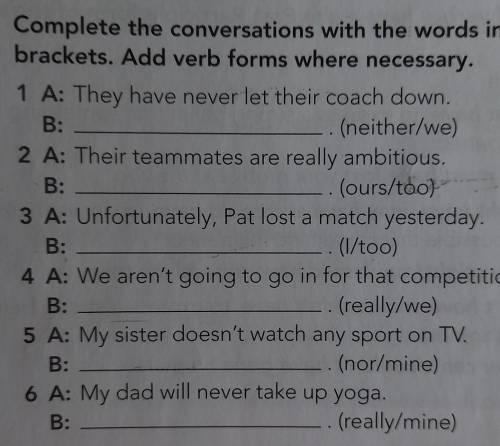Complete the conversations with the words in brackets. Add verb forms where necessary.
1 A: They have never let their coach down.
B:
(neither/we)
2 A: Their teammates are really ambitious.
B:
(ours/too)
3 A: Unfortunately, Pat lost a match yesterday.
B:
(l/too)
4 A: We aren't going to go in for that competition.
B:
-. (really/we)
5 A: My sister doesn't watch any sport on TV.
B:
(nor/mine)
6 A: My dad will never take up yoga.
B:
(really/mine)

Другие вопросы по теме Английский язык
Популярные вопросы
- Слово дымящиеся это прилагательное или причастие? и можно ещё морфологический...
2 - 1.определите жанр произведения. а)роман б) повесть в)семейно-бытовая хроника...
1 - Какие молодежные организации возникли стихийно? какие молодежные организации...
2 - Выберите верные утверждения а) если m ∈ z, то m ∈ q б) если m ∈ z, то m ∈...
1 - Кобщему знаменателю дробь 15/14 и 33/16...
3 - Каким словом можно заменить слово али...
2 - Сделайте слово песчаный под цифрой 3. до завтра если не сделать 2 поставят...
3 - Решить уравнение 1. 65+(х+23)=105 2. (у-34)-10=32 3. 9х+50=86 4. 120: (х-19)=6...
3 - Купорос розчиняється у воді? 7 клас...
2 - Tgt=2,4 п t 3п/2 найдите sint, cost, ctgt...
1
B: Neither have we.
Explanation: In this conversation, B agrees with A's statement and uses the word "neither" to show similarity or agreement. B also adds the verb "have" to complete the sentence.
2 A: Their teammates are really ambitious.
B: Ours are too.
Explanation: In this conversation, B agrees with A's statement and uses the word "too" to show similarity or agreement. B also uses the possessive pronoun "ours" to refer to their own teammates.
3 A: Unfortunately, Pat lost a match yesterday.
B: So did I.
Explanation: In this conversation, B agrees with A's statement and uses the phrase "so did I" to show similarity or agreement. B also adds the past tense of the verb "do" (did) to complete the sentence.
4 A: We aren't going to go in for that competition.
B: Neither are we.
Explanation: In this conversation, B agrees with A's statement and uses the word "neither" to show similarity or agreement. B also adds the verb "are" to complete the sentence.
5 A: My sister doesn't watch any sport on TV.
B: Nor does mine.
Explanation: In this conversation, B agrees with A's statement and uses the word "nor" to show similarity or agreement. B also uses the possessive pronoun "mine" to refer to their own sister.
6 A: My dad will never take up yoga.
B: Neither will mine.
Explanation: In this conversation, B agrees with A's statement and uses the word "neither" to show similarity or agreement. B also uses the verb "will" to complete the sentence.